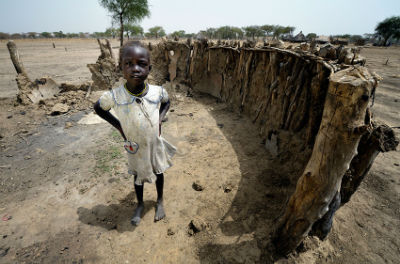 Press Release
Press ReleaseJuba, August 29, 2013 (SSNA) — A political solution alone will not resolve the conflict plaguing Abyei. Urgent attention needs to be paid to local conditions and efforts on the ground should move beyond humanitarian relief to focus on transitions that would result in long-term stability. That is the conclusion of a newly-released report by KUSH Inc. "Stabilizing Abyei: Trauma and the Economic Challenges to Peace," which provides analysis of the displaced Ngok Dinka population. The report shows the correlation between the severity of their circumstances and negative attitudes regarding the Misseriya and the possibility of peace in the area.
Since the May, 2011 invasion of Abyei, recovery has been slow with approximately half of the Internally Displaced People remaining displaced. Insecurity has persisted culminating in the death of Paramount Chief Kuol Deng Kuol in May of this year. More recently, the Misseriya have threatened war against South Sudan over its preparation for the referendum.
"With the bleak picture painted by the report, coupled with the lack of agreement on the conduct of referendum in October, Abyei will be at the brink unless the international community takes affirmative action” warns Dr. Luka Biong Deng, Executive Director of Kush.
A survey was conducted of the Ngok Dinka IDP population a year after the invasion of Abyei. The intent was to measure the people’s socio-economic and psychological conditions and see if there was a relationship between the population’s conditions and their views regarding the Misseriya and also of peace and reconciliation.
“We found very little variation among the people in terms of attitudes, income or ownership. The situation for the vast majority was grim, having lost their homes and valuables and without real opportunity for recovery” said Belkys López, lead author of the report. Close to all of the individuals surveyed, 98.8%, lost one or more real estate properties and over half of the sample indicated a monthly family income of 600 SSP.
Levels of trauma were assessed by measuring the presence of Post-Traumatic Stress Disorder. PTSD may occur in a person after experiencing or witnessing life threatening events. Symptoms may include intrusive thoughts, flashbacks, irritability or bouts of rage. Many in the community often spoke about the emotional toll the crisis had taken, and it was these concerns that led to the trauma study. The community’s speculations were well-founded.
The findings of the PTSD study show:
- 37.8% of the respondents met the criteria for PTSD.
- Approximately half of the women surveyed, 48.6%, met the criteria for PTSD.
“These numbers are alarming and the levels among the women point to a serious health crisis,” psychologist and co-author Dr. Hazel Spears cautions.
Findings show that the most vulnerable individuals among the population had the most negative attitudes toward the Misseriya and the prospect for peace. When questioned about the nomadic migration, trading with the Misseriya, peace talks, reconciliation and a peaceful resolution of the conflict, those with lower levels of education and income responded the most negatively.
“Though the present picture is discouraging, assisting the population in generating income and providing education are measures that are achievable and would help build peace” López suggests.
The authors recommend building the population’s resilience through practical initiatives and empowering citizens so that they may lead the area’s recovery. Accordingly, development efforts for the Ngok Dinka and Misseriya are essential to the regions stability and would help create an environment conducive for the implementation of a final political resolution.

